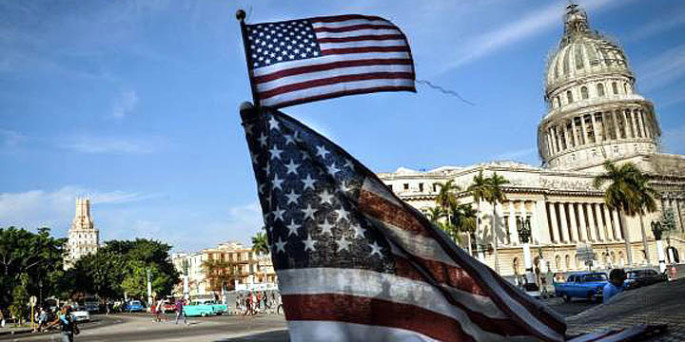
Cuba-U.S.: No talk of business yet
Even though little has come out from the talks in Havana between Cuba and the United States, on the other side of the Straits of Florida a movement is developing to land in the Cuban market as soon as possible.
The communiqués from the U.S. Rice Producers Association and the displays of interest on the part of the state of Virginia are joined by the press dispatches that tell about other coalitions and the visits of Cuban diplomats to U.S. cities in advance of the reestablishment of diplomatic relations.
After Dec. 17 and during the round of talks, two business groups based in New Orleans started their own form of rapprochement with the island. The International Cuba Society and the local organization En el Umbral (On the Threshold) on Thursday (Jan. 22) announced an alliance with the University of Havana to mark the inauguration of “Cuba Today: A Conference in Havana.”
The meeting, scheduled for March 14-21, will bring together civic leaders, business executives and legal experts to combine the academic, cultural and business fields of both countries.
The conference is expected to hold seminars on foreign property and investment, the development of energy and the environment and the ability to recover from natural disasters.
In April 2014, the head of the Cuban Interests Section in Washington, José Cabañas-Rodríguez, visited New Orleans for the purpose of facilitating a greater cultural exchange between that city and Cuba. Apparently, that was the inception of the Cuba Today conference.
Joe Doss, president of On the Threshold, said that this trip will help the state of Louisiana to position itself as a leader of the process of participation in Cuban society and will help set the bases for a mutually beneficial relationship.
The voyage of the U.S. participants to the conference is expected to be the first direct flight between New Orleans and Havana since 1958. The exchange will be protected by one of the 12 travel permits to Cuba authorized by the U.S. Treasury Department.
Other voices in Louisiana also have affirmed that a reestablishment of relations between Cuba and the U.S. could generate opportunities for business. Kevin Berken, chairman of the Louisiana Promotion Commission, said that before the blockade Cuba was the largest importer of rice grown in Louisiana.
Gary LaGrange, president and executive director of the Port of New Orleans, said that, once the blockade is eliminated, the coast of New Orleans will become an “especially convenient” port, as it was in the days when it was a gateway for nickel and limestone imports for U.S. industry. He also said that New Orleans is competing with Tampa and Miami as the possible home for a Cuban consulate.
At a meeting in the New Orleans Petroleum Club, other personalities in the business sector told of their experiences in relation with the island. Larry Sides, president of the Sides & Associates advertising company, said he was fascinated by Cuba.
“The only way in which the United States will be fully capable of establishing a full relationship with the country — and that includes tourism — is to lift the embargo completely,” Sides said.
For its part, the U.S. airline JetBlue applauded in a communiqué the initiative of the governor of New York State, Andrew Cuomo, to head one of the first commercial missions to Cuba in the next 45 days.
“The Governor’s vision for shaping responsible economic development with Cuba and investing in a world-class travel experience for New Yorkers are two important efforts to help our home state compete on the world stage,” said Robert Land, vice president of JetBlue Airways.
A spokeswoman for the Democratic governor said on Jan. 17 that “as part of the Global NY initiative, Governor Cuomo plans to head a trade mission to Cuba. This is one of several similar trips to promote New York that he plans to make in his next term.”
Economic analysts venture to quantify the amount of commercial exchange between the two nations. One day after the Dec. 17 announcement, experts at the Peterson Institute for International Economics calculated that the exports of U.S. products to Cuba could reach $4.3 billion a year and that Cuban exports could reach $5.8 billion a year — from a current zero dollars.
However, the package of measures published by the White House on Jan. 15 still does not offer the best scenario. The ruling by the Treasury Department does not contemplate imports from the island, sets a $400 limit per traveler for the one-time importation of Cuban products (only $100 in rum and tobacco), and restricts purchases in the U.S. to only a few items.
After the first round of talks in Havana, the chiefs of the delegations agreed that what happened on Jan. 21-22 was just the first step in a long journey not free of missteps — such as the use of the verb “to pressure.” During those days, there was no talk of business.
Progreso Semanal/ Weekly authorizes the total or partial reproduction of the articles by our journalists, so long as source and author are identified.

